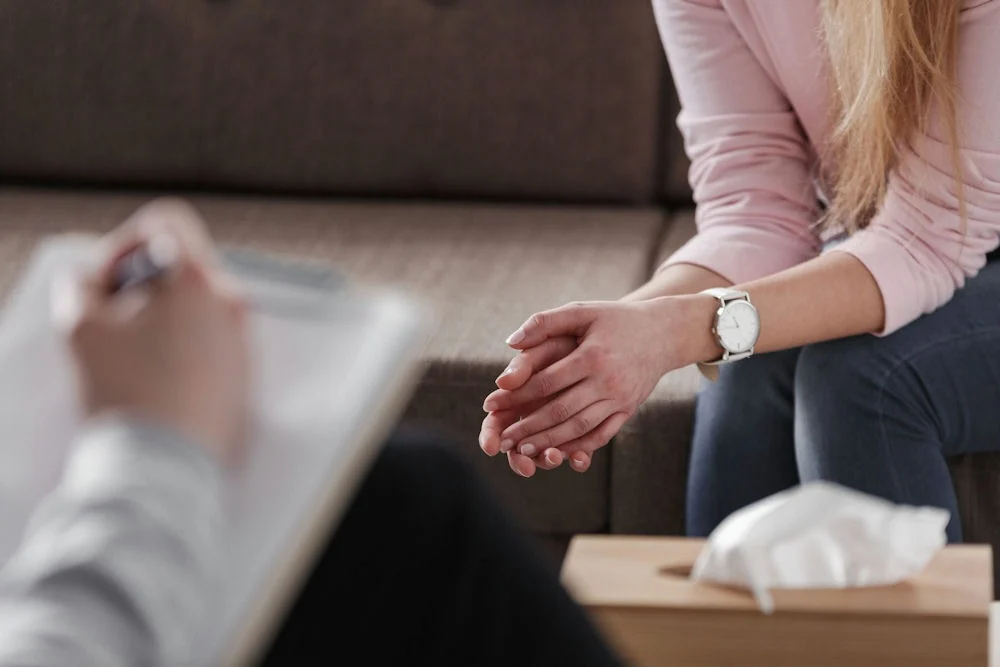Anxiety and dizziness often go hand in hand, creating a distressing cycle that can significantly impact daily life. Many people experiencing dizziness may not realize it’s linked to their anxiety, while others may worry that their dizziness signals a more serious health issue. Understanding the connection between these two symptoms is key to managing them effectively.
What is Dizziness?
Dizziness is an umbrella term encompassing various sensations, including lightheadedness, unsteadiness, and vertigo (which describes a spinning sensation). Other forms of dizziness include presyncope (near-fainting) and disequilibrium (a loss of balance).
While dizziness can stem from medical conditions like low blood pressure, migraines, or ear infections, anxiety is a common yet often overlooked cause. The key difference is that anxiety-induced dizziness tends to fluctuate with stress levels and may not have a clear physical trigger. Recognizing whether dizziness is anxiety-related or due to another condition is essential for proper treatment.
What Is the Connection Between Anxiety and Dizziness?
 The connection between anxiety and dizziness lies in the body’s physiological response to stress. When anxiety activates the fight-or-flight system, it triggers a surge of adrenaline, increasing heart rate and altering blood circulation. This can lead to lightheadedness, as blood flow to the brain may temporarily decrease.
The connection between anxiety and dizziness lies in the body’s physiological response to stress. When anxiety activates the fight-or-flight system, it triggers a surge of adrenaline, increasing heart rate and altering blood circulation. This can lead to lightheadedness, as blood flow to the brain may temporarily decrease.
Anxiety often causes rapid, shallow breathing. This is known as hyperventilation. This disrupts oxygen and carbon dioxide levels, further contributing to dizziness. Another factor is heightened sensory awareness — people with anxiety may become overly attuned to minor bodily sensations, interpreting normal fluctuations in balance as something more serious. This hypervigilance can create a feedback loop where dizziness triggers more anxiety, which in turn worsens dizziness.
Chronic anxiety can affect the vestibular system, which is the body’s balance center, making individuals more prone to dizziness even in non-stressful situations. Understanding this bidirectional relationship is key to breaking the cycle.
Types of Dizziness Associated with Anxiety
Anxiety-related dizziness typically presents in three main forms:
Lightheadedness
This feels like faintness or a floating sensation, and is often linked to hyperventilation or blood pressure changes. It may worsen when a person stands up quickly or during moments of high stress. Many people describe it as feeling like they might pass out, though actual fainting is rare with anxiety-related lightheadedness. The sensation typically subsides once breathing normalizes and anxiety levels decrease.
Vertigo-like sensations
Some people describe a spinning or swaying feeling when experiencing anxiety-related dizziness, even though true vertigo is usually caused by inner ear issues. Anxiety can mimic vertigo by disrupting the brain’s balance-processing centers, creating false motion signals. These episodes often occur during panic attacks or periods of intense anxiety, and can last anywhere from a few seconds to several minutes. Unlike true vertigo, anxiety-induced vertigo sensations usually aren’t accompanied by hearing changes or severe nausea.
Dissociative dizziness
This involves a feeling of detachment from one’s body or surroundings, common during panic attacks. It may feel like walking on a boat or being disconnected from reality, and is often described as “brain fog” or similar to out-of-body experiences. This type is particularly common in people with trauma histories or severe anxiety disorders. The dizziness often improves when using grounding techniques that reconnect the person to their physical environment.
Understanding which type of dizziness you experience can help tailor treatment strategies, such as breathing exercises for lightheadedness or grounding techniques for dissociation.
Can Anxiety Cause Dizziness?
Yes, anxiety can directly cause dizziness through multiple mechanisms. The fight-or-flight response, triggered by anxiety, leads to physiological changes like rapid breathing and an increased heart rate. These responses can reduce blood flow to the brain, resulting in lightheadedness. Hyperventilation lowers carbon dioxide levels in the blood, causing blood vessels to constrict and further decreasing oxygen delivery to the brain.
Another way anxiety can contribute to dizziness is through muscle tension, particularly in the neck and shoulders, which can affect blood circulation and balance. Anxiety can heighten sensitivity to motion, making individuals more prone to motion sickness or dizziness in response to minor movements.
It is important to note that dizziness caused by anxiety is usually temporary and subsides once the stress response diminishes. However, chronic anxiety can make these episodes more frequent and severe.
The Role of Hyperventilation in Anxiety-Induced Dizziness

Hyperventilation is a major factor in anxiety-related dizziness. When a person breathes too quickly, they expel excessive carbon dioxide, leading to hypocapnia (low carbon dioxide levels). This causes blood vessels to constrict, reducing oxygen flow to the brain and resulting in lightheadedness, tingling, and even chest pain.
Many people with anxiety unknowingly hyperventilate during stressful moments, worsening their dizziness. Techniques such as diaphragmatic breathing, which involves deep belly breaths, can help restore normal carbon dioxide levels and alleviate symptoms. Practicing slow breathing exercises can also train the body to avoid hyperventilation during anxiety episodes.
Common Anxiety Disorders Linked to Dizziness
Though dizziness can manifest as a physical symptom of any form of anxiety (especially in chronic cases), some anxiety disorders have stronger links than others. The following anxiety disorders are strongly associated with dizziness:
- Panic Disorder: Sudden dizziness often accompanies panic attacks, along with chest tightness and a fear of losing control. The abrupt onset can make individuals mistake dizziness for a heart attack or other medical emergency.
- Generalized Anxiety Disorder (GAD): Chronic stress from GAD can lead to persistent dizziness due to prolonged muscle tension and hyperventilation. People with GAD may also fixate on their dizziness, which can make their symptoms worse.
- Agoraphobia: Fear of open or crowded spaces can trigger dizziness, as the brain associates certain environments with danger. This can lead to avoidance behaviors that reinforce anxiety.
- Health Anxiety: Excessive worry about dizziness can create a vicious cycle where the fear of fainting or having a serious illness intensifies symptoms.
Effective anxiety treatment in Orange County tailored to these conditions—such as cognitive behavioral therapy, mindfulness practices, or medication—can help break the cycle and reduce dizziness symptoms.
Tips for Managing Anxiety
Anxiety-induced dizziness can feel overwhelming, but it’s important to remember that you can reduce the intensity of the condition with the help of good mental health practices. To reduce anxiety-related dizziness, consider these evidence-based strategies:
Slow, controlled breathing helps counteract hyperventilation and stabilizes oxygen levels in the bloodstream. The 4-7-8 technique is particularly effective for calming the nervous system. To practice this technique, inhale for 4 seconds, hold your breath for 7 seconds, and then exhale for 8 seconds. Regular practice can train your body to maintain proper breathing patterns even during stressful situations.
Focusing on sensory input helps anchor you during dizzy spells by redirecting attention away from anxious thoughts. Consider using the 5-4-3-2-1 method to calm yourself. This grounding exercise prompts you to identify 5 things you see, 4 you can touch, 3 you hear, 2 you smell, and 1 that you taste. This technique works by engaging the prefrontal cortex to override panic responses.
Moderate physical activity, like walking or yoga, can help regulate stress hormones. It can also help improve cardiovascular health, reducing dizziness episodes. Exercise also promotes better sleep, which is crucial for anxiety management. Aim for at least 30 minutes of movement most days. Avoid overexertion, which can trigger dizziness symptoms.
Substances like caffeine and alcohol can exacerbate anxiety and dizziness by affecting a person’s blood pressure, hydration, and nervous system function. Caffeine stimulates adrenaline production, while alcohol disrupts inner ear fluid balance. Gradually reducing intake of both substances often leads to noticeable improvements in symptom frequency and intensity.
Individual therapy can not only help manage symptoms of anxiety, but also identify the root of it. Some types of therapy can be especially beneficial for those who experience dizziness due to anxiety.
Cognitive behavioral therapy (CBT) helps identify and reframe thought patterns that contribute to anxiety-induced dizziness. Exposure therapy gradually desensitizes you to dizziness triggers in a controlled environment. Professional therapy and guidance ensures these techniques are applied effectively for lasting results.
Dehydration and blood sugar fluctuations can mimic or worsen anxiety-related dizziness. Eating regular, protein-rich meals and drinking enough water helps maintain stable blood pressure and energy levels. Keeping electrolyte levels balanced is especially important if you frequently experience dizziness.
Poor sleep quality lowers your threshold for anxiety and dizziness symptoms. Establishing a consistent sleep schedule and creating a restful bedroom environment can significantly reduce symptoms. Addressing sleep issues often has a cascading positive effect on overall anxiety levels.
Inpatient mental health programs, such as the kind Laguna Shores Mental Health offers, provide a serene environment to focus on healing. Good mental health is essential for overall well-being and your ability to fulfill your life obligations. In a residential program, you can benefit from round-the-clock care and an individualized treatment plan that ensures you get the help you need. One of your goals can be to leave the program with essential skills for managing anxiety.
Recovering From Anxiety and Dizziness at Laguna Shores Mental Health
If anxiety-related dizziness is disrupting your daily routine, professional support can provide the tools for lasting relief. Anxiety and dizziness are deeply interconnected, but this cycle can be broken with the right strategies. Recognizing the signs and seeking help early can lead to better management and a healthier, more balanced life.
At Laguna Shores Mental Health, we provide comprehensive treatment for anxiety and dizziness through personalized care plans. Our approach includes evidence-based therapies that help patients understand and reframe anxiety triggers. We also incorporate relaxation techniques (such as mindfulness and biofeedback) to regulate the body’s stress response.
We’re here to help — contact Laguna Shores Mental Health to learn more.

 The connection between anxiety and dizziness lies in the body’s physiological response to stress. When anxiety activates the fight-or-flight system, it triggers a surge of adrenaline, increasing heart rate and altering blood circulation. This can lead to lightheadedness, as blood flow to the brain may temporarily decrease.
The connection between anxiety and dizziness lies in the body’s physiological response to stress. When anxiety activates the fight-or-flight system, it triggers a surge of adrenaline, increasing heart rate and altering blood circulation. This can lead to lightheadedness, as blood flow to the brain may temporarily decrease.
